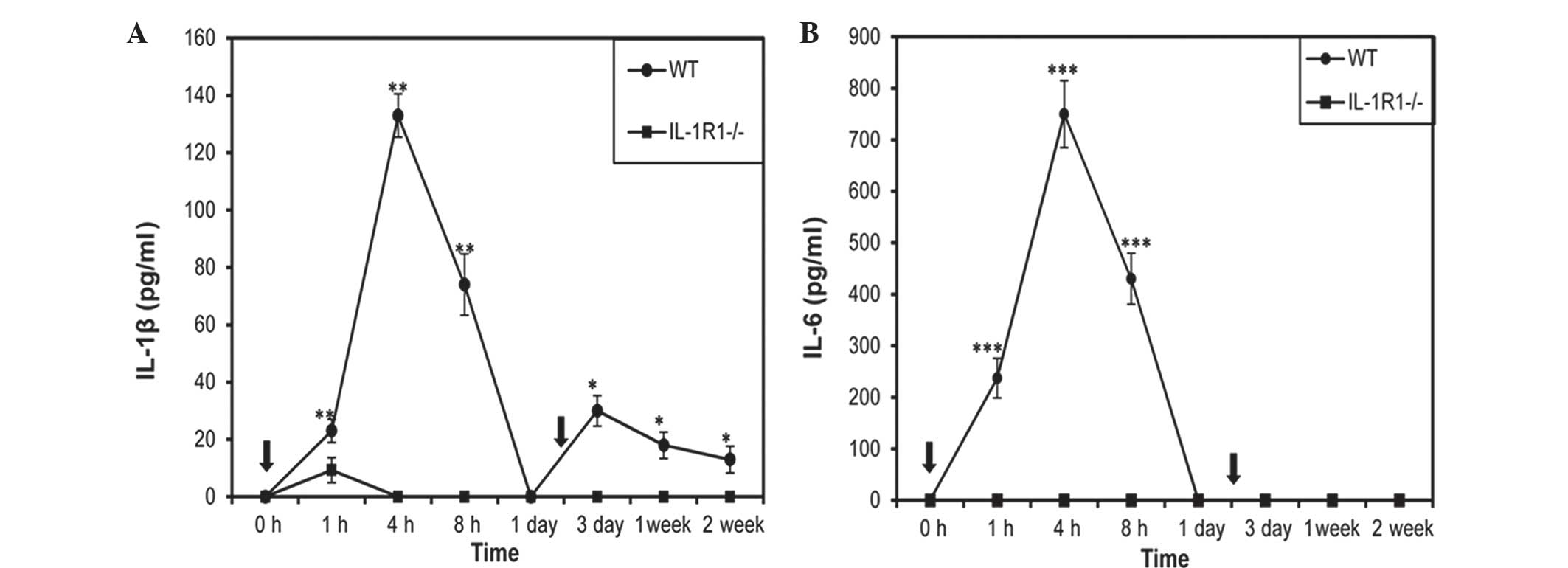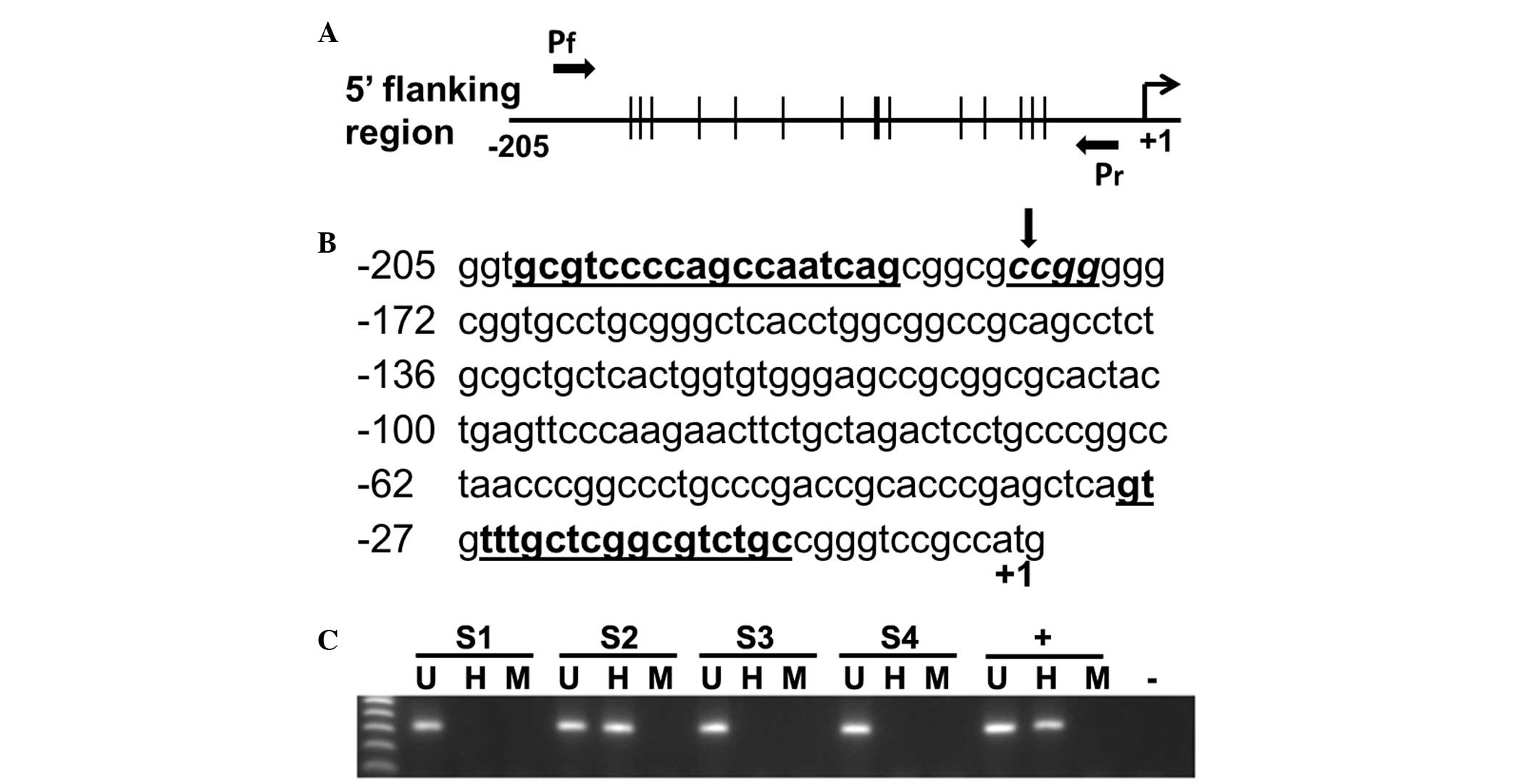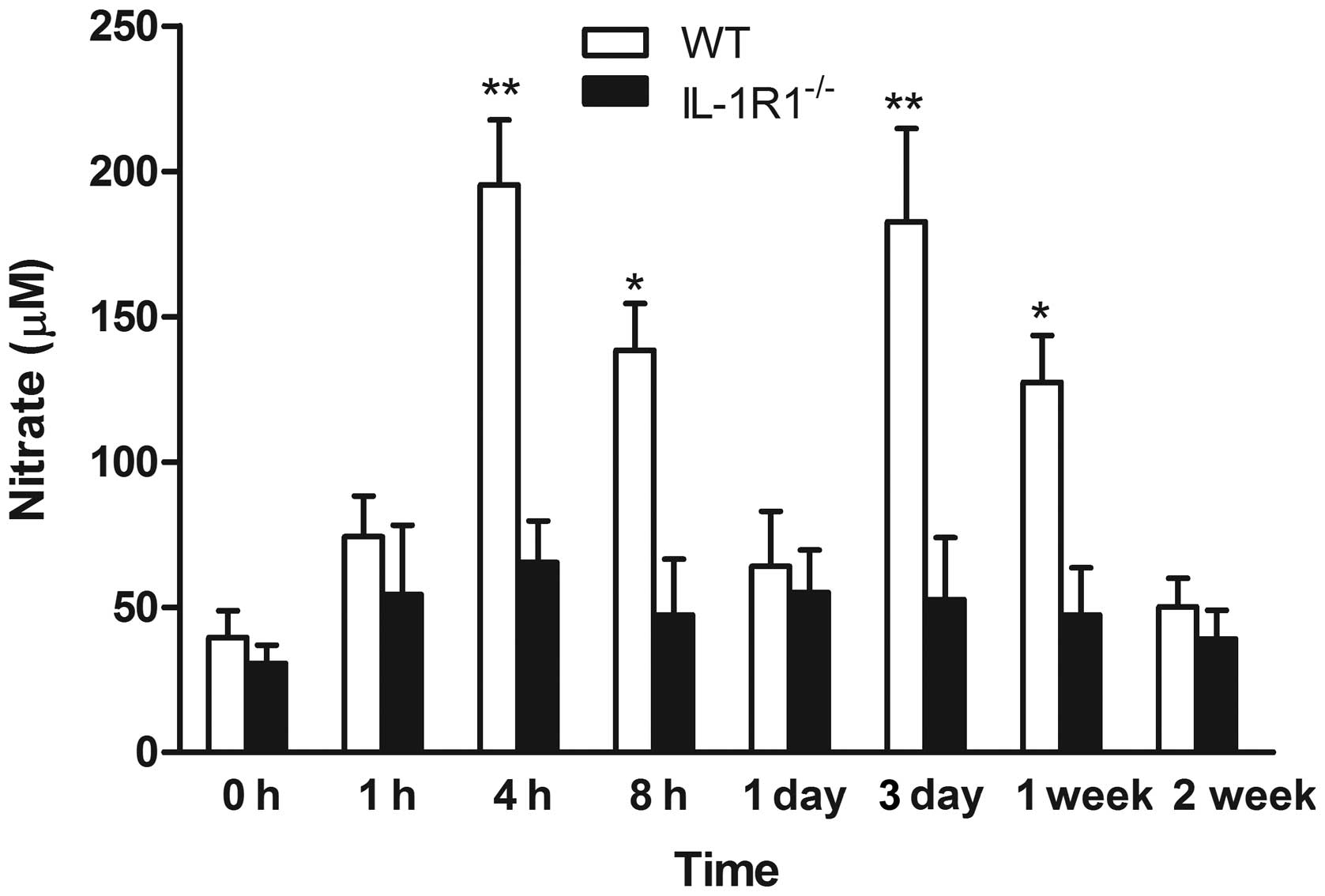|
1
|
Mantovani A, Marchesi F, Portal C,
Allavena P and Sica A: Linking inflammation reactions to cancer:
Novel targets for therapeutic strategies. Adv Exp Med Biol.
610:112–127. 2008. View Article : Google Scholar : PubMed/NCBI
|
|
2
|
Mantovani A, Allavena P, Sica A and
Balkwill F: Cancer-related inflammation. Nature. 454:436–444. 2008.
View Article : Google Scholar : PubMed/NCBI
|
|
3
|
March CJ, Mosley B, Larsen A, et al:
Cloning, sequence and expression of two distinct human
interleukin-1 complementary DNAs. Nature. 315:641–647. 1985.
View Article : Google Scholar : PubMed/NCBI
|
|
4
|
Noach LA, Bosma NB, Jansen J, et al:
Mucosal tumor necrosis factor-α, interleukin-1 β, and interleukin-8
production in patients with Helicobacter pylori infection.
Scand J Gastroenterol. 29:425–429. 1994. View Article : Google Scholar : PubMed/NCBI
|
|
5
|
Huang FY, Chan AO, Lo RC, et al:
Characterization of interleukin-1β in Helicobacter
pylori-induced gastric inflammation and DNA methylation in
interleukin-1 receptor type 1 knockout (IL-1R1(−/-)) mice. Eur J
Cancer. 49:2760–2770. 2013. View Article : Google Scholar : PubMed/NCBI
|
|
6
|
Shigematsu Y, Niwa T, Rehnberg E, et al:
Interleukin-1β induced by Helicobacter pylori infection
enhances mouse gastric carcinogenesis. Cancer Lett. 340:141–147.
2013. View Article : Google Scholar : PubMed/NCBI
|
|
7
|
Tu S, Bhagat G, Cui G, et al:
Overexpression of interleukin-1β induces gastric inflammation and
cancer and mobilizes myeloid-derived suppressor cells in mice.
Cancer Cell. 14:408–419. 2008. View Article : Google Scholar : PubMed/NCBI
|
|
8
|
Kohase M, May LT, Tamm I, Vilcek J and
Sehgal PB: A cytokine network in human diploid fibroblasts:
Interactions of β-interferons, tumor necrosis factor,
platelet-derived growth factor, and interleukin-1. Mol Cell Biol.
7:273–280. 1987. View Article : Google Scholar : PubMed/NCBI
|
|
9
|
Jaiswal M, LaRusso NF and Gores GJ: Nitric
oxide in gastrointestinal epithelial cell carcinogenesis: Linking
inflammation to oncogenesis. Am J Physiol Gastrointest Liver
Physiol. 281:G626–G634. 2001.PubMed/NCBI
|
|
10
|
Wink DA and Mitchell JB: Nitric oxide and
cancer: An introduction. Free Radic Biol Med. 34:951–954. 2003.
View Article : Google Scholar : PubMed/NCBI
|
|
11
|
Chan AO, Lam SK, Wong BC, et al: Promoter
methylation of E-cadherin gene in gastric mucosa associated with
Helicobacter pylori infection and in gastric cancer. Gut.
52:502–506. 2003. View Article : Google Scholar : PubMed/NCBI
|
|
12
|
Park SY, Yoo EJ, Cho NY, Kim N and Kang
GH: Comparison of CpG island hypermethylation and repetitive DNA
hypomethylation in premalignant stages of gastric cancer,
stratified for Helicobacter pylori infection. J Pathol.
219:410–416. 2009. View Article : Google Scholar : PubMed/NCBI
|
|
13
|
Maekita T, Nakazawa K, Mihara M, et al:
High levels of aberrant DNA methylation in Helicobacter
pylori-infected gastric mucosae and its possible association
with gastric cancer risk. Clin Cancer Res. 12:989–995. 2006.
View Article : Google Scholar : PubMed/NCBI
|
|
14
|
Choi IS and Wu TT: Epigenetic alterations
in gastric carcinogenesis. Cell Res. 15:247–254. 2005. View Article : Google Scholar : PubMed/NCBI
|
|
15
|
Chan AO, Peng JZ, Lam SK, et al:
Eradication of Helicobacter pylori infection reverses
E-cadherin promoter hypermethylation. Gut. 55:463–468. 2006.
View Article : Google Scholar : PubMed/NCBI
|
|
16
|
Hmadcha A, Bedoya FJ, Sobrino F and
Pintado E: Methylation-dependent gene silencing induced by
interleukin 1β via nitric oxide production. J Exp Med.
190:1595–1604. 1999. View Article : Google Scholar : PubMed/NCBI
|
|
17
|
Qian X, Huang C, Cho CH, Hui WM, Rashid A
and Chan AO: E-cadherin promoter hypermethylation induced by
interleukin-1β treatment or H. pylori infection in human
gastric cancer cell lines. Cancer Lett. 263:107–113. 2008.
View Article : Google Scholar : PubMed/NCBI
|
|
18
|
Huang FY, Chan AO, Rashid A, et al:
Helicobacter pylori induces promoter methylation of
E-cadherin via interleukin-1β activation of nitric oxide production
in gastric cancer cells. Cancer. 118:4969–4980. 2012. View Article : Google Scholar : PubMed/NCBI
|
|
19
|
Kwon KH, Murakami A, Hayashi R and
Ohigashi H: Interleukin-1β targets interleukin-6 in progressing
dextran sulfate sodium-induced experimental colitis. Biochem
Biophys Res Commun. 337:647–654. 2005. View Article : Google Scholar : PubMed/NCBI
|
|
20
|
Huang H, Ushijima T, Nagao M, Sugimura T
and Ohgaki H: β-catenin mutations in liver tumors induced by
2-amino-3,4-dimethylimidazo[4,5-f]quinoline in CDF1 mice. Cancer
Lett. 198:29–35. 2003. View Article : Google Scholar : PubMed/NCBI
|
|
21
|
Yamada H, Vijayachandra K, Penner C and
Glick A: Increased sensitivity of transforming growth factor (TGF)
β 1 null cells to alkylating agents reveals a novel link between
TGFβ signaling and O(6)-methylguanine methyltransferase promoter
hypermethylation. J Biol Chem. 276:19052–19058. 2001. View Article : Google Scholar : PubMed/NCBI
|
|
22
|
Livak and Schmittgen: Analysis of relative
gene expression data using real-time quantitative PCR and the
2-ΔΔCt method. Methods. 25:402–408. 2001. View Article : Google Scholar : PubMed/NCBI
|
|
23
|
Chan AO, Chu KM, Huang C, et al:
Association between Helicobacter pylori infection and
interleukin 1β polymorphism predispose to CpG island methylation in
gastric cancer. Gut. 56:595–597. 2007. View Article : Google Scholar : PubMed/NCBI
|
|
24
|
Griess P: Comments on the discussion of HH
Weselsky and Benedict ‘On some Azo Compounds’. Ber Deutsch Chem
Ges. 12:426–428. 1879. View Article : Google Scholar
|
|
25
|
Bradford MM: A rapid and sensitive method
for the quantitation of microgram quantities of protein utilizing
the principle of protein-dye binding. Anal Biochem. 72:248–254.
1976. View Article : Google Scholar : PubMed/NCBI
|
|
26
|
Epstein NJ, Warme BA, Spanogle J, et al:
Interleukin-1 modulates periprosthetic tissue formation in an
intramedullary model of particle-induced inflammation. J Orthop
Res. 23:501–510. 2005. View Article : Google Scholar : PubMed/NCBI
|
|
27
|
El-Omar EM: The importance of interleukin
1β in Helicobacter pylori associated disease. Gut.
48:743–747. 2001. View Article : Google Scholar : PubMed/NCBI
|
|
28
|
Skelly DT, Hennessy E, Dansereau MA and
Cunningham C: A systematic analysis of the peripheral and CNS
effects of systemic LPS, IL-1β, TNF-β and IL-6 challenges in
C57BL/6 mice. PloS One. 8:e691232013. View Article : Google Scholar : PubMed/NCBI
|
|
29
|
Klapproth J, Castell J, Geiger T, Andus T
and Heinrich PC: Fate and biological action of human recombinant
interleukin 1 β in the rat in vivo. Eur J Immunol.
19:1485–1490. 1989. View Article : Google Scholar : PubMed/NCBI
|
|
30
|
Hur K, Niwa T, Toyoda T, et al:
Insufficient role of cell proliferation in aberrant DNA methylation
induction and involvement of specific types of inflammation.
Carcinogenesis. 32:35–41. 2011. View Article : Google Scholar : PubMed/NCBI
|
|
31
|
Attwood J and Richardson B: Relative
quantitation of DNA methyltransferase mRNA by real-time RT-PCR
assay. Methods Mol Biol. 287:273–283. 2004.PubMed/NCBI
|
|
32
|
Kanai Y and Hirohashi S: Alterations of
DNA methylation associated with abnormalities of DNA
methyltransferases in human cancers during transition from a
precancerous to a malignant state. Carcinogenesis. 28:2434–2442.
2007. View Article : Google Scholar : PubMed/NCBI
|
|
33
|
Nakajima T, Yamashita S, Maekita T, et al:
The presence of a methylation fingerprint of Helicobacter
pylori infection in human gastric mucosae. Int J Cancer.
124:905–910. 2009. View Article : Google Scholar : PubMed/NCBI
|
|
34
|
Niwa T, Tsukamoto T, Toyoda T, et al:
Inflammatory processes triggered by Helicobacter pylori
infection cause aberrant DNA methylation in gastric epithelial
cells. Cancer Res. 70:1430–1440. 2010. View Article : Google Scholar : PubMed/NCBI
|


















